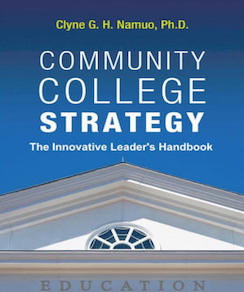Before I begin, I would like to congratulate the faculty and staff at OCCRL on your 25th anniversary. I commend you for the work you’ve done over the past 25 years as you have contributed to raising the profile of community colleges and I look forward to the next 25 years as you continue to advance our field while producing scholars and practitioners who will strengthen the strategic position of community colleges.
When Dr. Bragg invited me to contribute to this blog, I wondered if my research would connect with the research being done at OCCRL. Having read through what the center has produced and most recently through the Transformative Change Initiative this spring, I have found some areas where we envision a very similar future for community colleges. My research and new book are about the strategic positioning of community colleges in response to reduced financial resources. Naturally, this is a topic that is very close to the hearts of practitioners as they are living through the great state divestment in community colleges. Receding state support has forced community colleges to make some very difficult decisions regarding the prioritization of programs, staffing, support services, tuition increases, and many more. Ultimately, the decisions we make during these challenging fiscal times will impact the strategic direction and position of community colleges well into the future. Prior to the release of my book, I spoke to a number of groups at different institutions and as a presenter at different conferences (League of Innovation and NISOD). Considering the potentially depressing topic of my research, one might expect my book to resemble a Greek tragedy. Rather, my book is about resilience. It is about the creative strategies employed by community college leaders to manage the crisis of receding state support. States like Arizona, Illinois, and California were particularly hard hit by these reductions at a time when research and history showed that we would be experiencing record enrollments; and we did. Droves of students flocked to community colleges to be retrained as victims of the great recession.
My book titled “Community College Strategy: The Innovative Leader’s Handbook” has recently been published and released by NorLights Press and presents the findings of my research for an intended audience of both practitioners and scholars alike. I write about the strategic strength of “Embedded Community Colleges”, institutions committed to establishing and maintaining strong, enduring relationships with their local community stakeholders. These institutions are deeply invested in sustaining mutually-beneficial, symbiotic relationships with community entities like K-12 school districts, local chambers of commerce, local hospitals, military installations, local law enforcement entities, and more. It is these types of institutions that will thrive during difficult financial times because their strategic orientation is no longer so reliant on the whims of state funding sources but rather on the economic, educationally-driven vitality of its local community. As I read about OCCRL’s Transformative Change Initiative (TCI), I commend the Center for its contributions in the area of Transformative Leadership (Guiding Principle #1), Networks and Professional Development (Guiding Principle #3), and Targeted Sharing and Dissemination (Guiding Principle #6) as each of these calls upon community colleges to participate in embedded activities.
As a researcher and community college leader, I remain optimistic about our future and look forward to how we as scholars and leaders will help to shape that future.
Dr. Clyne G. H. Namuo is the author of Community College Strategy: The Innovative Leader’s Handbook published by NorLights Press. Dr. Namuo holds a Ph.D. from the Center for the Study of Higher Education at the University of Arizona.
